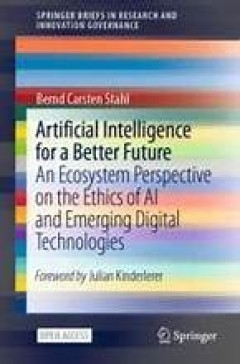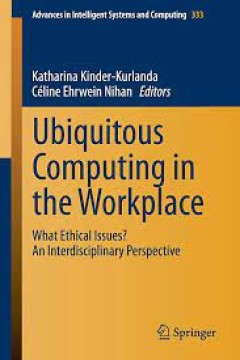Filter by

Technological Utopianism and the Idea of Justice
This open access book advances a modest defence of technological utopias. While technological utopianism is not devoid of risks and elitism, their benefits should not be discounted in an overall assessment. Rather than rejecting them based on a too narrow definition of utopianism, we must acknowledge their potential to exceed the individualist vs. collectivist dichotomy ascribed to traditional …
- Edition
- 1
- ISBN/ISSN
- 9783031759451
- Collation
- IX, 156 hlm; ill., lamp.,
- Series Title
- -
- Call Number
- -

Values for a Post-Pandemic Future
This open access book shows how value sensitive design (VSD), responsible innovation, and comprehensive engineering can guide the rapid development of technological responses to the COVID-19 crisis. Responding to the ethical challenges of data-driven technologies and other tools requires thinking about values in the context of a pandemic as well as in a post-COVID world. Instilling values must …
- Edition
- -
- ISBN/ISSN
- 978-3-031-08424-9
- Collation
- X, 250
- Series Title
- Philosophy of Engineering and Technology (POET, volume 40)
- Call Number
- 600 VAL

Reality Lost: Markets of Attention, Misinformation and Manipulation
This open access book looks at how a democracy can devolve into a post-factual state. The media is being flooded by populist narratives, fake news, conspiracy theories and make-believe. Misinformation is turning into a challenge for all of us, whether politicians, journalists, or citizens. In the age of information, attention is a prime asset and may be converted into money, power, and influ…
- Edition
- 1
- ISBN/ISSN
- 9783030008130
- Collation
- XXII, 144hlm; ill., lamp.,
- Series Title
- -
- Call Number
- -

Responsible Innovation 1
This book addresses the methodological issues involved in responsible innovation and provides an overview of recent applications of multidisciplinary research. Responsible innovation involves research into the ethical and societal aspects of new technologies (e.g. ICT, nanotechnology, biotechnology and brain sciences) and of changes in technological systems (e.g. energy, transport, agriculture …
- Edition
- 1
- ISBN/ISSN
- 978-94-017-8956-1
- Collation
- -
- Series Title
- 26 b/w illustrations
- Call Number
- XXIII, 392

Artificial Intelligence for a Better Future
This open access book proposes a novel approach to Artificial Intelligence (AI) ethics. AI offers many advantages: better and faster medical diagnoses, improved business processes and efficiency, and the automation of boring work. But undesirable and ethically problematic consequences are possible too: biases and discrimination, breaches of privacy and security, and societal distortions such as…
- Edition
- 1
- ISBN/ISSN
- 978-3-030-69978-9
- Collation
- -
- Series Title
- SpringerBriefs in Research and Innovation Governance
- Call Number
- X, 124

Theory and Practice of Sociosensitive and Socioactive Systems
Interactive adaptive systems increasingly become part of our everyday life. Which factors could shape this development and under which conditions will interactions with technical systems be deemed socially appropriate? The "FActors of Social Appropriateness" (FASA) Model presented in this Open Access-book provides a structured approach to our understanding of social appropriateness in human-tec…
- Edition
- 1
- ISBN/ISSN
- 978-3-658-36946-0
- Collation
- -
- Series Title
- -
- Call Number
- XV, 166

Theory and Practice of Sociosensitive and Socioactive Systems
Interactive adaptive systems increasingly become part of our everyday life. Which factors could shape this development and under which conditions will interactions with technical systems be deemed socially appropriate? The "FActors of Social Appropriateness" (FASA) Model presented in this Open Access-book provides a structured approach to our understanding of social appropriateness in human-tec…
- Edition
- 1
- ISBN/ISSN
- 978-3-658-36946-0
- Collation
- -
- Series Title
- 6 b/w illustrations, 11 illustrations in colour
- Call Number
- XV, 166

Philosophy of Technology after the Empirical Turn
This volume features 16 essays on the philosophy of technology that discuss its identity, its position in philosophy in general, and the role of empirical studies in philosophical analyses of engineering ethics and engineering practices. This volume is published about fifteen years after Peter Kroes and Anthonie Meijers published a collection of papers under the title The empirical turn in …
- Edition
- 1
- ISBN/ISSN
- 978-3-319-33717-3
- Collation
- Filsafat
- Series Title
- Philosophy of Engineering and Technology
- Call Number
- 100

The Onlife Manifesto
What is the impact of information and communication technologies (ICTs) on the human condition? In order to address this question, in 2012 the European Commission organized a research project entitled The Onlife Initiative: concept reengineering for rethinking societal concerns in the digital transition. This volume collects the work of the Onlife Initiative. It explores how the development and…
- Edition
- 1
- ISBN/ISSN
- 978-3-319-04093-6
- Collation
- -
- Series Title
- XIV, 264
- Call Number
- -

Ubiquitous Computing in the Workplace What Ethical Issues? An Interdisciplin…
This book provides an interdisciplinary collection of views on the ethical challenges and opportunities of workplaces in the Internet of things. Current developments within Ubiquitous computing (ubicomp) systems designed for the workplace are introduced and philosophical, organizational and socio-ethical considerations of ubicomp in workplaces are provided. Suggestions regarding the rules that …
- Edition
- -
- ISBN/ISSN
- 978-3-319-13452-9
- Collation
- -
- Series Title
- -
- Call Number
- -
 Computer Science, Information & General Works
Computer Science, Information & General Works  Philosophy & Psychology
Philosophy & Psychology  Religion
Religion  Social Sciences
Social Sciences  Language
Language  Pure Science
Pure Science  Applied Sciences
Applied Sciences  Art & Recreation
Art & Recreation  Literature
Literature  History & Geography
History & Geography